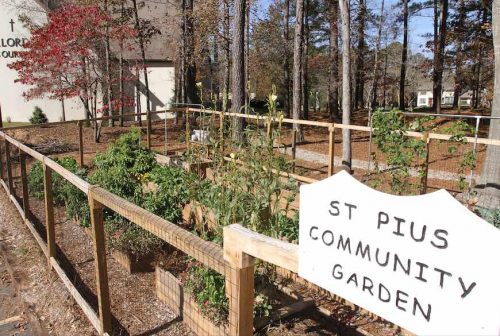Some of us will occasionally feel the guilt carefully planted in childhood when our mothers, fathers or caretakers told us to clean our plates because somewhere in the world another child, just like us, was going hungry and was wishing for the food we were wasting.
I was a particularly bad case. As a child with little appetite, I would hide mounds of food under the tablecloth and put my empty plate on top of it as if no one would notice that the food underneath made it lopsided.

Though I felt guilty, it didn’t stop me from wasting food. As an adult, that guilt returns when I throw away fruits, vegetables or leftovers that expired in the fridge before I had time to eat them. This time, my parents aren’t the ones calling me out on the food I waste, but the pope.
Wasting food amounts to “stealing from the table of the poor and the hungry,” the pope said in 2013 on United Nations World Environment Day. One of the most recent estimates by the U.N. Food and Agriculture Organization says we waste about 1.3 billion tons of food annually — or a third of what is produced around the world.
Though he was addressing larger issues surrounding food waste, such as lack of sustainable agriculture, exploitation of natural resources and consumerism, all of us — especially those of us obsessed with the latest trends in food — contribute to these larger problems by the choices we make, including the food we buy, how much we buy, where we buy it and how we consume it or don’t consume it.
When the Vatican released in 2015 the pope’s encyclical on the environment, the now famous “Laudato Si’, on Care for Our Common Home,” I set out to find a way to heed its call.
One way seemed to find me in the form of an invitation to join a community garden near my Washington neighborhood. I affectionately call it my “Laudato Si’” garden, and if you search for it on Twitter, you’ll see that a lot of people have had the same idea.
It seemed like fun at first, but the enchantment quickly wore off when I had to claw the dry ground to get the weeds out, and when the seeds and starter plants I plopped down didn’t quickly yield the beautiful tomatoes and peppers promised on the packaging. Within two weeks, I was ready to give up.

With help and encouragement from other community gardeners, however, I kept at it and slowly, the plot began yielding radishes, squash blossoms and cilantro.
But taking care of a garden yields more than just produce. It teaches you that growing food, even on a small scale, is hard work. It makes you reflect on the conditions of workers who put cheap produce on our tables and whether it’s cheap because they don’t get paid a lot.
It makes you think about excessive packaging, our consumption of it, our unnecessary waste and, ultimately, about the central role that food plays in the health of our common home, as the pope calls it, and the health of the least among us.
“This culture of waste,” said the pope in that speech on World Environment Day, “has made us insensitive even to the waste and disposal of food, which is even more despicable when all over the world, unfortunately, many individuals and families are suffering from hunger and malnutrition.”
 Though I no longer hide food under my plate, I still waste food that many in the streets of my city, including some who live on the streets near the community garden, long for. The food-related chidings of my childhood, now coming from the lips of our pope, still apply.
Though I no longer hide food under my plate, I still waste food that many in the streets of my city, including some who live on the streets near the community garden, long for. The food-related chidings of my childhood, now coming from the lips of our pope, still apply.
“Once our grandparents were very careful not to throw away any leftover food,” the pope said. “Consumerism has led us to become used to an excess and daily waste of food, to which, at times, we are no longer able to give a just value.”
It’s been a year since “Laudato Si’” challenged us as Christians and as people of goodwill to do something to care for our common home. I can say that, since then, I have made an effort to incorporate more composting as part of my routine. I recycle more materials than in the past. I also make different choices by opting to buy food with the least amount of packaging that I can find.
But I still wonder if this is enough? Have I, and have the rest of us, done enough to answer the urgent call we received a year ago to care for our common home?
Rhina Guidos is special projects editor for Catholic News Service.






















